Doctoral dissertation by Lluís Parcerisa
Methodological notes by Lluís Parcerisa
REFORMED Methodological Papers No.3, 2023
This paper presents the methodological approach of the REFORMED project research strand 2 (RS2), ... more This paper presents the methodological approach of the REFORMED project research strand 2 (RS2), specifically, of its qualitative phase. Following a sequential mixed-methods design approach, the qualitative phase aimed to understand the rationales behind different forms of engagement of schools with SAWA policies. The main emphasis is placed on how these policies are interpreted and translated into practice by school actors in different educational and socio-material realities. The main aim of this note is threefold. First, it describes the research objectives and presents an overview of the research design. Second, it presents the data-collection and data-analysis strategies, with a focus on the coding of the interviews. Finally, it reflects on research challenges and points out possible future steps of the study.
Journal Articles by Lluís Parcerisa
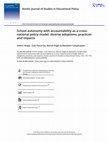
Nordic Journal of Studies in Educational Policy, 2024
This special issue examines the policy model of School Autonomy with Accountability (SAWA) and it... more This special issue examines the policy model of School Autonomy with Accountability (SAWA) and its diverse configurations. The focus is on understanding how SAWA reforms shape governance practices and influence educational systems in different educational settings. Drawing on a range of theoretical perspectives, the issue explores how political factors, administrative traditions, and local professional frameworks shape the adoption and evolution of these policies. SAWA reforms promote school autonomy in decision-making while holding schools accountable for performance outcomes through various instruments such as standardized assessments, school improvement projects, and accountability arrangements. However, these policies often create tensions between autonomy and accountability, and their implementation produces varied outcomes depending on local contexts and institutions. The issue also highlights the growing role of data use in educational decision-making and examines the challenges associated with policy enactment at the school level. Taking stock of these discussions, in this introduction to the special issue, we delve into the complexities of SAWA reforms and their implications for educational equity, innovation, and governance. We also highlight the need for further research into the dynamic interaction between the formulation of SAWA policies and their local implementation, particularly in underexamined national contexts.
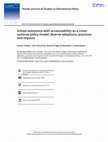
Nordic Journal of Studies in Educational Policy, 2024
This special issue examines the policy model of School Autonomy with Accountability (SAWA) and it... more This special issue examines the policy model of School Autonomy with Accountability (SAWA) and its diverse configurations. The focus is on understanding how SAWA reforms shape governance practices and influence educational systems in different educational settings. Drawing on a range of theoretical perspectives, the issue explores how political factors, administrative traditions, and local professional frameworks shape the adoption and evolution of these policies. SAWA reforms promote school autonomy in decision-making while holding schools accountable for performance outcomes through various instruments such as standardized assessments, school improvement projects, and accountability arrangements. However, these policies often create tensions between autonomy and accountability, and their implementation produces varied outcomes depending on local contexts and institutions. The issue also highlights the growing role of data use in educational decision-making and examines the challenges associated with policy enactment at the school level. Taking stock of these discussions, in this introduction to the special issue, we delve into the complexities of SAWA reforms and their implications for educational equity, innovation, and governance. We also highlight the need for further research into the dynamic interaction between the formulation of SAWA policies and their local implementation, particularly in underexamined national contexts.

Review of Research in Education, 2024
Performance-based accountability (PBA) has gained popularity worldwide due to its promise to stre... more Performance-based accountability (PBA) has gained popularity worldwide due to its promise to strengthen the effectiveness and equity of educational systems. Nonetheless, its implementation does not always generate the expected reactions within schools. Through a configurative review, we systematically reviewed 133 empirical studies focusing on PBA side effects. We provide novel insights into the literature on PBA side effects, generating a better understanding of how and under what circumstances they are more likely to occur and through which mechanisms. In contrast to existing reviews, our research includes country contexts where accountability designs are predominantly low-stakes and challenges dichotomous ways of thinking about PBA systems. It uncovers side effects across diverse accountability frameworks and investigates differences and similarities in the mechanisms driving them.

Educational Assessment, Evaluation and Accountability, 2024
The most well-known and controversial version of accountability policies is highstakes testing. H... more The most well-known and controversial version of accountability policies is highstakes testing. However, various countries employ diverse instruments of 'soft accountability' or low-stakes accountability tools. This paper highlights the main results of a study conducted in Chile that examines the enactment of one of these soft accountability tools, namely the school inspection system, which is particularly complex as-unlike standardised tests-it involves a face-to-face assessment. The research project is a qualitative study following 12 'school inspection networks' that include a documentary analysis of the school reports delivered (N = 12), as well as in-depth interviews with headteachers and the inspectors who assessed the schools (N = 24). The research findings question the contribution of school inspections. Even though this soft accountability technology can produce enriching information, while a performance-based accountability framework is maintained, the potential contribution of school inspection is trapped by the overall performance-based rationale.
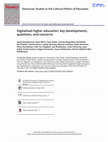
Discourse: Studies in the Cultural Politics of Education, 2024
Higher education is already profoundly digitalised. Students, academics, and university administr... more Higher education is already profoundly digitalised. Students, academics, and university administrators routinely use digital technologies, many of which rely on data, including artificial intelligence. Universities aim to operate as data-powered organisations to support institutional efficiency and the
personalisation of learning and student experience. These developments are occurring against the backdrop of university digital infrastructure moving to the cloud and the increasing role of ‘Big Tech’ in the sector. However, there are many unknowns about the aggregate impact of digitalisation on the sector, and hence, questions about potential risks and harms remain unanswered. Our approach in this collective piece is to reflect on particularly relevant and impactful dynamics of higher education digitalisation. We first identify assetisation as an emergent mode of governance linked to the digitalisation of HE, which brings new temporal, relational, and lock-in challenges for universities and their constituents. Second, we examine the macro-level structural transformation of higher education with the increasing
role of Big Tech and Big EdTech. We conclude by discussing the consequences of the identified macro power dynamics.
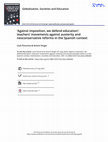
Globalisation, Societies and Education, 2024
Between 2011 and 2015, at the dawn of the global financial crisis, Spain
went through severe aust... more Between 2011 and 2015, at the dawn of the global financial crisis, Spain
went through severe austerity measures that led to social unrest and to
the emergence of new expressions of collective action. In the
educational field, teachers’ unions and grassroots movements organised
against the neoliberal and neoconservative policies promoted by the
central government and several regional governments. The case of the
Teachers’ Assembly in the Balearic Islands is particularly relevant
because it was a highly successful protest experience that triggered
unprecedented social mobilisation and broad social support. Drawing
on social movement theories and combining semi-structured interviews
with document and media analysis, this study finds that the
combination of alliance-building, disruptive collective actions, and
framing processes was key to explaining the success of the social
mobilisation.
Educational Policy, 2024
Under test-based accountability, undesired teachers' responses-including illicit practices to inf... more Under test-based accountability, undesired teachers' responses-including illicit practices to inflate test results-are usually associated to so-called high-stakes policies. However, the influence of different types of stakes in the generation of undesired effects has been overlooked in education research. Based on a survey experiment, our results indicate that the type and level of stakes (e.g. high-vs low-stakes, material vs symbolic) do not differ in triggering undesired accountability effects. Counterintuitively, individual symbolic consequences trigger similar reactions among teachers than material incentives. Indepth interviews give insights into the social mechanisms that lead to symbolic effects having such an influence in understanding teachers' reactivity to accountability.
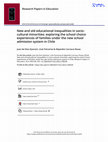
Research Papers in Education, 2024
In 2016, the Chilean Ministry of Education implemented the new School Admission System (SAS) desi... more In 2016, the Chilean Ministry of Education implemented the new School Admission System (SAS) designed with the goal of equalizing access to schools for the most disadvantaged families and reduce educational segregation. Yet it is not clear if the SAS is sensitive to socio-cultural minorities and their particular conditions. Hence, in this article we explore the school choice experiences of parents from three socio-cultural minorities under the new SAS: Mapuche – indigenous families, Latin American migrant parents, and parents with children with disabilities. Using an intersectional theoretical approach and a qualitative research design, we show that while in some cases the implementation of SAS impedes previous discriminatory processes, in others this new system alone has not yet overcome long-established and inherent educational inequalities in Chilean education. Besides, SAS has also resulted in new challenges in the school choice processes of these parents. Their experiences with the SAS express the intersection of different axis of inequality, according to the conditions and historicities of each group of families. Finally, we reflect on the challenges that the policy faces in regard to develop an educational policy that is fairer to all families, in the context of the unequal and marketized Chilean educational system.
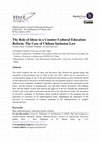
Multidisciplinary Journal of Educational Research, 2024
The article explores the role of ideas and discourses that allowed the agenda-setting and enactme... more The article explores the role of ideas and discourses that allowed the agenda-setting and enactment of the Inclusion Law in Chile in the year 2015, which can be conceived as a countercultural change in one of the most marketized educational systems worldwide. Based on the framework of discursive institutionalism, the investigation analyses sixteen interviews with key actors (ministers, academics, legislators, advisers) involved in the enactment of such policy, and the analysis of parliamentary acts and other official documents. The findings show that the debate of ideas that allowed the approval of the law included the mobilization of ideas such as the right to education and the end of the educational market, the generation of discursive strategies of persuasion about technical elements of the program and the generation of consensus on its implementation times, highlighting the importance of the processes of construction of common meanings in the implementation of complex educational laws.

JOURNAL OF EDUCATIONAL ADMINISTRATION AND HISTORY, 2023
This article analyses the case of Rosa Sensat teachers' movement in Catalonia during the final ye... more This article analyses the case of Rosa Sensat teachers' movement in Catalonia during the final years of Francoism and the transition to democracy in Spain (1965-1990). This movement was a key actor in education reform debates in that period. Based on the perspective of political process theory, the article focuses on the contextual, organisational and discursive dynamics that define the Rosa Sensat movement, and its role as a sociopolitical actor in three historical periods: (i) the moment of emergence, linked to the dissident schools (1965-1970); (ii) the process of transition to democracy and educational decentralisation, marked by the difficulties in reforming public education (1970-1977); and (iii) the post-transition period, marked by the new constitution, the integration of dissident schools into the public system (1978-1990) and the marginalisation of the movement. The conclusions highlight its influence and subsequent decline as a sociopolitical actor in education reform.

REICE. Revista Iberoamericana sobre Calidad, Eficacia y Cambio en Educación, 2024
El presente postdigital está caracterizado por una suerte de plataformización de la sociedad lide... more El presente postdigital está caracterizado por una suerte de plataformización de la sociedad liderada por las grandes corporaciones tecnológicas, y que tiene consecuencias en aspectos relacionados con la datificación, la gestión de la privacidad y los derechos de la ciudadanía. El concepto de soberanía digital surge como un espacio de reflexión en construcción sobre el que diferentes actores, especialmente administraciones, proponen gestionar derechos y deberes, entre los que se encuentran los que afectan a la educación. Este artículo explora la evolución en la investigación sobre soberanía digital a través de una scoping review de literatura. Entre los resultados destacamos: (a) el aumento exponencial del interés sobre la temática en los últimos tres años, (b) el creciente número de análisis con un foco global y supranacional, (c) el mayor interés desde el campo de las ciencias sociales, (d) la existencia de definiciones centradas en una visión estatal y (e) la aparición de un corpus emergente de literatura con enfoque multiescalar. Se constata que estamos ante una realidad a debate de espectro global, que las administraciones intentan gestionar desde lógicas estado-céntricas.

European Journal of Education, 2023
The global popularity of test-based accountability appears to signal political trust in standardi... more The global popularity of test-based accountability appears to signal political trust in standardised assessments as valid and relevant measures of education quality. Nonetheless, research shows that educators' perceptions of standardised testing and test-based accountability can vary significantly, as do their responses to accountability demands. Considering the key influence of teachers' beliefs on the way in which they respond to education reforms, in this article we examine teachers' beliefs and opinions about standardised tests and test-based accountability. We analyse a comparative study on interpretations and experiences of standardised testing and test-based accountability demands of compulsory education teachers in Chile and Norway. These cases were selected following a most-different-systems design approach. The data was derived from an electronic survey (n = 2,531) and in-depth interviews (n = 41). The analysis shows how in both contexts, teachers are relatively critical about the validity, usefulness and fairness of standardised tests. This indicates lacking teacher trust in standardised testing and test-based accountability. Still, despite similar trends, some key differences in the beliefs of Chilean and Norwegian teachers are found, which highlight the influence of the sociocultural context in shaping teachers' beliefs. By illuminating how teachers in different contexts make sense of test-based accountability, our analysis contributes to the understanding of why the often-reported mismatch between policy expectations and policy outcomes might occur.
This article reviews the development of the framing perspective on social movements since its eme... more This article reviews the development of the framing perspective on social movements since its emergence over three decades ago. The review led to three conclusions. During this period, the impact of the perspective has increased, its conceptual development has continued, and the types of the studies have shown major changes and continuities. For example, the initial predominance of descriptive and static studies has changed with the development of a significant number of explanatory studies on both framing and frame transformations, as well as on the consequences of their characteristics for the social movement. However, studies on frame structure or the emotions they evoke are still rare.

DEBATS, 2023
Durant la legislatura autonòmica 2011-2015, el sector educatiu de les Illes Balears es va veure i... more Durant la legislatura autonòmica 2011-2015, el sector educatiu de les Illes Balears es va veure immers en un profund procés de transformació educativa que va combinar l'aplicació d'unes estrictes polítiques d'austeritat amb un ambiciós pla de reforma del model lingüístic. Com a resultat d'aquestes reformes van sorgir nous actors col•lectius i xarxes d'acció col•lectiva, i va esclatar un conflicte sense precedents en el camp educatiu balear, que va culminar amb la convocatòria d'una aturada indefinida. Aquesta investigació té com a objectiu analitzar la trajectòria de la mobilització social contra aquestes reformes educatives i les raons que n'expliquen l'èxit. Teòricament, la investigació es basa en l'enfocament de procés polític, que integra factors estructurals i ideacionals. Metodològicament, l'estudi de cas es basa en el mètode de process-tracing, i en l'anàlisi de 20 entrevistes semiestructurades amb actors clau i de documents. Les troballes mostren que la construcció de ponts entre diferents marcs de significat, juntament amb la combinació de repertoris d'acció col•lectiva de diferent naturalesa, expliquen, en gran manera, l'èxit del moviment social analitzat.
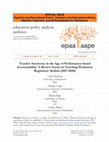
Education Policy Analysis Archives, 2022
In recent decades, the governance of educational systems has experienced dramatic changes in many... more In recent decades, the governance of educational systems has experienced dramatic changes in many countries. Schools have been given more autonomy whilst being held increasingly accountable at the central level through standardized testing and other forms of external evaluation.
The mechanisms of performance-based accountability (PBA) and the consequences attached to test results vary. In high-stakes systems, teachers’ careers are more directly connected to students’ performance, and low performing schools might risk closure, whereas in lower-stakes systems, the official administrative consequences of accountability for school actors are more symbolic than material. The main aim of this paper is to understand the impact of different forms of PBA on teachers’ work from a comparative perspective. Most research on this topic is based on singlecontext case studies, which makes it difficult to understand the impact of policy factors and professional contexts in teachers’ decisions and autonomy. To address this challenge, we review recent investigations (2017-2020) on the topic and compare their findings in different teachers' regulatory contexts. The review includes 101 articles from the SCOPUS and Web of Science databases. We find that evidence on the impact of PBA on teachers’ perceptions and beliefs are variegated, and that the implications of PBA on teachers’ autonomy does not only depend on the level of accountability stakes, but on teachers’ professional regulation
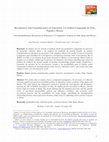
Revista Izquierdas, 2022
El objetivo de este artículo es analizar, desde una perspectiva comparada, los procesos de resist... more El objetivo de este artículo es analizar, desde una perspectiva comparada, los procesos de resistencia colectiva frente a las políticas de rendición de cuentas basadas en pruebas estandarizadas en educación en tres países: Chile, España y México. El estudio se basa en el método comparativo para identificar las convergencias y divergencias existentes entre el movimiento Alto al SIMCE en Chile, el movimiento de protestas docentes en México y el movimiento Marea Verde en España. Los resultados señalan que los procesos de adopción y las formas específicas que toman las políticas de rendición de cuentas basadas en pruebas estandarizadas pueden incidir, condicionar y constreñir las acciones de los movimientos sociales y las posibilidades para el cambio social, subrayando la relación de interdependencia entre acción y estructura social y que resulta clave para explicar el éxito o no de la protesta social.

Foro de Educación, 2022
Research has shown that in many contexts, the transformation of the public sector associated with... more Research has shown that in many contexts, the transformation of the public sector associated with new public management (NPM) reforms and performance-based accountability (PBA) has had profound implications for public sector workers' practices, identities and emotional experiences. Focusing on the education sector, in this paper we aim to contribute to the understanding of the relationship between PBA policies and teachers’ emotions by conducting a scoping review of the scientific literature. Our review, which is based on a final sample of 63 articles published between the years 2000-2021 obtained from the SCOPUS database, identifies two main bodies of research. The first deals with an examination of teachers’ emotions and shows how PBA is a crucial part of a changing professional environment that accentuates and/or modifies feelings and emotions already inherent to the teaching profession. The focal point of the second strand of research is the effect of PBA on teachers’ emotions; here, we identify research exploring the emotional effects of PBA, as well as the mechanisms behind different emotional experiences, how teachers deal with emotions emerging from PBA policies and a number of factors that intensify or weaken the emotional impact of PBA. On the basis of our review, limitations of existing research and gaps in the understanding of the relationship between PBA and teachers’ emotions are identified and promising lines of future research formulated.
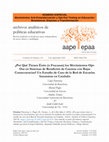
Education Policy Analysis Archives, 2022
La evaluación externa de las escuelas basada en los resultados de los estudiantes es una política... more La evaluación externa de las escuelas basada en los resultados de los estudiantes es una política controvertida entre la comunidad educativa. En diferentes países han surgido movimientos de oposición a las pruebas estandarizadas, especialmente enaquellos contextos con sistemas de high-stakes accountability. Sin embargo, este fenómeno no se ha estudiado en sistemas de soft accountability. Este artículo analiza las razones que explican la emergencia y el éxito (o no) del movimiento de “escuelas insumisas” en Cataluña, entendido como un movimiento anti-estandarización en un sistema de soft accountability. Para ello, adoptamos el estudio de caso como estrategia metodológica, a partir de la triangulación de entrevistas semiestructuradas con activistas (n=14), actores clave (n=3), y análisis de prensa y documentos (n= 25). Los resultados arrojan luz sobre la emergencia y naturaleza del movimiento, su estructura de oportunidades, los marcos discursivos y los repertorios de acción colectiva. Nuestros resultados muestran cómo los instrumentos de rendición de cuentas adquieren ‘vida propia’ más allá de su diseño. De este modo, el movimiento de escuelas insumisas en Cataluña identifica riesgos y efectos adversos similares a los identificados en sistemas high-stakes, desplegando un repertorio de acción colectiva y marcos discursivos parecidos a otros movimientos anti-estandarización emergentes.


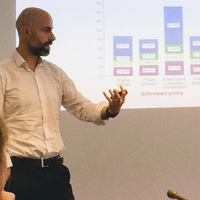








Uploads
Doctoral dissertation by Lluís Parcerisa
Methodological notes by Lluís Parcerisa
Journal Articles by Lluís Parcerisa
personalisation of learning and student experience. These developments are occurring against the backdrop of university digital infrastructure moving to the cloud and the increasing role of ‘Big Tech’ in the sector. However, there are many unknowns about the aggregate impact of digitalisation on the sector, and hence, questions about potential risks and harms remain unanswered. Our approach in this collective piece is to reflect on particularly relevant and impactful dynamics of higher education digitalisation. We first identify assetisation as an emergent mode of governance linked to the digitalisation of HE, which brings new temporal, relational, and lock-in challenges for universities and their constituents. Second, we examine the macro-level structural transformation of higher education with the increasing
role of Big Tech and Big EdTech. We conclude by discussing the consequences of the identified macro power dynamics.
went through severe austerity measures that led to social unrest and to
the emergence of new expressions of collective action. In the
educational field, teachers’ unions and grassroots movements organised
against the neoliberal and neoconservative policies promoted by the
central government and several regional governments. The case of the
Teachers’ Assembly in the Balearic Islands is particularly relevant
because it was a highly successful protest experience that triggered
unprecedented social mobilisation and broad social support. Drawing
on social movement theories and combining semi-structured interviews
with document and media analysis, this study finds that the
combination of alliance-building, disruptive collective actions, and
framing processes was key to explaining the success of the social
mobilisation.
The mechanisms of performance-based accountability (PBA) and the consequences attached to test results vary. In high-stakes systems, teachers’ careers are more directly connected to students’ performance, and low performing schools might risk closure, whereas in lower-stakes systems, the official administrative consequences of accountability for school actors are more symbolic than material. The main aim of this paper is to understand the impact of different forms of PBA on teachers’ work from a comparative perspective. Most research on this topic is based on singlecontext case studies, which makes it difficult to understand the impact of policy factors and professional contexts in teachers’ decisions and autonomy. To address this challenge, we review recent investigations (2017-2020) on the topic and compare their findings in different teachers' regulatory contexts. The review includes 101 articles from the SCOPUS and Web of Science databases. We find that evidence on the impact of PBA on teachers’ perceptions and beliefs are variegated, and that the implications of PBA on teachers’ autonomy does not only depend on the level of accountability stakes, but on teachers’ professional regulation
personalisation of learning and student experience. These developments are occurring against the backdrop of university digital infrastructure moving to the cloud and the increasing role of ‘Big Tech’ in the sector. However, there are many unknowns about the aggregate impact of digitalisation on the sector, and hence, questions about potential risks and harms remain unanswered. Our approach in this collective piece is to reflect on particularly relevant and impactful dynamics of higher education digitalisation. We first identify assetisation as an emergent mode of governance linked to the digitalisation of HE, which brings new temporal, relational, and lock-in challenges for universities and their constituents. Second, we examine the macro-level structural transformation of higher education with the increasing
role of Big Tech and Big EdTech. We conclude by discussing the consequences of the identified macro power dynamics.
went through severe austerity measures that led to social unrest and to
the emergence of new expressions of collective action. In the
educational field, teachers’ unions and grassroots movements organised
against the neoliberal and neoconservative policies promoted by the
central government and several regional governments. The case of the
Teachers’ Assembly in the Balearic Islands is particularly relevant
because it was a highly successful protest experience that triggered
unprecedented social mobilisation and broad social support. Drawing
on social movement theories and combining semi-structured interviews
with document and media analysis, this study finds that the
combination of alliance-building, disruptive collective actions, and
framing processes was key to explaining the success of the social
mobilisation.
The mechanisms of performance-based accountability (PBA) and the consequences attached to test results vary. In high-stakes systems, teachers’ careers are more directly connected to students’ performance, and low performing schools might risk closure, whereas in lower-stakes systems, the official administrative consequences of accountability for school actors are more symbolic than material. The main aim of this paper is to understand the impact of different forms of PBA on teachers’ work from a comparative perspective. Most research on this topic is based on singlecontext case studies, which makes it difficult to understand the impact of policy factors and professional contexts in teachers’ decisions and autonomy. To address this challenge, we review recent investigations (2017-2020) on the topic and compare their findings in different teachers' regulatory contexts. The review includes 101 articles from the SCOPUS and Web of Science databases. We find that evidence on the impact of PBA on teachers’ perceptions and beliefs are variegated, and that the implications of PBA on teachers’ autonomy does not only depend on the level of accountability stakes, but on teachers’ professional regulation
policy among school actors. Movements of opposition have emerged in different countries,
especially in those contexts with high-stakes accountability systems. However, this phenomenon has
not been analyzed in soft accountability systems. The objective of this article is to study the opt-out
movement in Catalonia, understood as an anti-standardization movement in a system of soft
accountability. In order to do so, we adopt the case study approach as a methodological strategy,
based on the triangulation of semi-structured interviews with activists (n = 14), key stakeholders (n =
3), and document and press analysis (n = 25). The results shed light on the emergence and nature of
the movement, its opportunity structures, the discursive frames and the repertoires of collective
action. Our results show how accountability instruments have a ‘life of their own’ beyond their
policy design. In this sense, the opt-out movement in Catalonia identifies potential risks and adverse
effects similar to those reported in high-stakes systems, developing a repertoire of collective action
and discursive frames similar to other emerging anti-standardization movements in high-stakes
contexts.
los discursos, prácticas y preocupaciones de la comunidad educativa respecto a la gobernanza digital de la educación. Finalmente, exploramos las relaciones entre el derecho a la privacidad y la alfabetización digital crítica.
This chapter analyses why and how TBA has been rapidly disseminated and adopted as a key mechanism of regulatory governance in education worldwide. The chapter shows that the global diffusion of TBA responds to a combination of drivers of a different nature, namely discursive, political, technologic, and economic. The chapter also shows that, despite the current consensus around the desirability of TBA’s adoption, the most relevant international organisations in the education policy field are disseminating this policy technology with different goals and through different rationalities and instruments.
El objetivo del capítulo, por tanto, no es tanto identificar qué políticas se han aplicado durante los últimos años sino entender por qué y cómo se han aplicado; cuál ha sido su lógica de intervención; cómo se han justificado y explicado. Se trata, por tanto, de entender la teoría del cambio que se esconde bajo el diseño y aplicación de dichas políticas. En particular, se pretende identificar cuáles son las prioridades programáticas y las lógicas discursivas de la acción gubernamental actual bajo el objetivo de fomentar el éxito escolar.
multidimensional que tiene en los jóvenes y niños que participan. Este trabajo está basado metodológicamente en 60 cuestionarios a jóvenes y familias del centro, 8 entrevistas a profesionales y equipo directivo y un grupo de discusión a entidades de la red asociativa del barrio, así como sesiones de observación y análisis documental. Entre los principales resultados, encontramos el incremento de la autoconfianza y la motivación para la práctica educativa, el aumento de las expectativas educativas y profesionales de los jóvenes, o el avivamiento de su sentimiento de pertenencia hacia la educación y especialmente
hacia la institución que les ha acogido y escuchado, entre otros.
Durante la legislatura 2011-2015, el sector educativo de las Islas Baleares estuvo inmerso en un profundo proceso de cambio que combinó la aplicación de severas medidas de austeridad (reducción de plantillas, precarización de las condiciones laborales de los docentes, recortes en atención a la diversidad, becas comedor, etc.), con un ambicioso plan de reforma en el ámbito lingüístico (libre elección de lengua en la enseñanza e incorporación de un modelo trilingüe). Asimismo, el proceso de reforma autonómica estuvo travesado por el inicio de una reforma educativa a nivel estatal, la LOMCE. Estas reformas desencadenaron un intenso conflicto educativo y social que vivió su punto álgido con la convocatoria de una huelga indefinida en el sector educativo, y que estuvo acompañada por una movilización social masiva sin precedentes en el contexto balear. Este movimiento social emergente consiguió introducir sus demandas en el centro del debate político y en la agenda de todos los partidos de la oposición. Contribuyó también al desgaste del Gobierno del Partido Popular balear, que perdió las últimas elecciones autonómicas.
RESUM
Durant la legislatura 2011-2015, el sector educatiu de les Illes Balears va estar immers en un profund procés de canvi que combinà l’aplicació de mesures severes d’austeritat (reducció de plantilles, precarització de les condicions laborals dels docents, retallades en atenció a la diversitat, beques menjador, etc.) amb un ambiciós pla de de reforma en l’àmbit lingüístic (lliure elecció de llengua a l’ensenyament i implantació d’un model trilingüe). Així mateix, el procés de reforma autonòmica va estar travessat per l’inici d’una reforma educativa d’àmbit estatal, la LOMQE. Aquestes reformes varen desencadenar un intens conflicte educatiu i social que va viure el punt àlgid amb la convocatòria de vaga indefinida al sector educatiu, acompanyada d’una mobilització social massiva sense precedents en el context balear.Aquest moviment social emergent va aconseguir introduir les seves demandes al centre del debat polític i a l’agenda de tots els partits de l’oposició. Contribuí també al desgast del govern del Partit Popular balear, que va perdre les últimes eleccions autonòmiques.
La segregació escolar és un dels principals reptes socials i educatius que interpel·la el sistema educatiu català, i amb la signatura del Pacte contra la segregació escolar s’ha convertit en una aposta de país. Aconseguir una escolarització equilibrada és un repte complex, que requereix actuacions coordinades en molts àmbits diferents. La present obra analitza el procés d'implementació del programa Magnet i els factors facilitadors i dificultadors per aconseguir mobilitzar els actors i canviar les dinàmiques d’escolarització en favor d’una major equitat educativa.
Side effects and the enactment of accountability: results of a comparative study in two German federal states // C. Thiel 403
Coping with performance expectations: towards a deeper understanding of variation in school principals' responses to accountability demands // M.K. Camphuijsen 427
To align or not to align: the enactment of accountability and data-use in disadvantaged school contexts // L. Parcerisa 455
Test-based accountability and perceived pressure in an autonomous education system: does school performance affect teacher experience? // N. Browes 483
Numbers and their contexts: how quantified actors narrate numbers and decontextualization // N. Piattoeva 511
Enacting performance-based accountability in a Southern European school system: between administrative and market logics // M. Pagès 535
To resist, or to align? The enactment of data-based school governance in Italy // P. Landri 563
COMMENTARY: Performance-based accountability systems cross-nationally: learning by comparing // J. Spillane 581